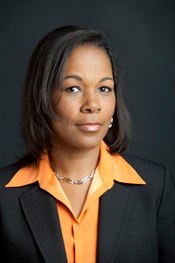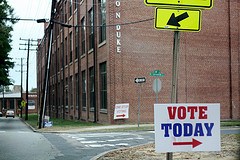
Our Community
Editor’s Note: This guest post comes from Judith Browne-Dianis, Co-Director of the Advancement Project, a policy, communications and legal action group committed to racial justice founded by a team of veteran civil rights lawyers in 1999.
 Attacks on Democracy went on trial last Thursday at a hearing held by the U.S. Senate Judiciary Committee’s Subcommittee on the Constitution, Civil Rights, and Human Rights. At the hearing, Hans von Spakovsky of the Heritage Foundation continued the Right’s persistent campaign of misinformation. Along with Professor Justin Levitt of Loyola Law School, I had the opportunity to testify and set the record straight about the war on democracy that is being waged by conservative state legislators and backed by the American Legislative Exchange Council (a favorite charitable deduction of the notorious Koch Brothers).
Attacks on Democracy went on trial last Thursday at a hearing held by the U.S. Senate Judiciary Committee’s Subcommittee on the Constitution, Civil Rights, and Human Rights. At the hearing, Hans von Spakovsky of the Heritage Foundation continued the Right’s persistent campaign of misinformation. Along with Professor Justin Levitt of Loyola Law School, I had the opportunity to testify and set the record straight about the war on democracy that is being waged by conservative state legislators and backed by the American Legislative Exchange Council (a favorite charitable deduction of the notorious Koch Brothers).
This year has marked the largest legislative effort to roll back voting rights in more than a century. In response to record turnout in 2008—specifically among young voters, low-income voters, seniors and voters of color—a dozen states have passed new laws designed to impede voters at every step of the electoral process. New barriers aimed at neutralizing these surges and systematically disenfranchising already registered voters have included:
Of all of these barriers, the most pervasive threat to voting rights are new identification restrictions, which have so far passed in five states. To be clear, I do not believe that voters should be allowed to vote without demonstrating their identity. The devil here is in the details. The new laws limit identification to an unexpired, photo identification issued by the state or federal government, whereas federal law already requires identification to register but permits multiple forms including utility bills, student and employee IDs, and bank statements.

Despite the oft-repeated presumption that everyone has ID, statistics show that it is simply not true. In South Carolina, 178,000 already registered voters lack a driver’s license or state identification. Twenty-three percent of people in Wisconsin age 65 and over, and half of African Americans and Latinos in the state, lack the requisite ID. In Texas, Wisconsin, and South Carolina, voters will not be able to use college identification. Each of these groups saw a jump in participation in 2008 but they are now at risk of being silenced.
While states will be required to provide this new identification for free, significant hurdles exist for voters. First, voters without state-issued photo ID will have to provide and, in many cases, pay for underlying documents. A certified birth certificate would cost $22 in Texas. A passport could cost up to $145. These new laws require citizens to pay to vote, effectively making them modern day poll taxes. Furthermore, in many states the offices where these IDs must be obtained have been closed or hours significantly reduced due to budget cuts. This makes it even more difficult for would-be voters.
Such a widespread effort to roll back the clock on voting rights is motivated by an insidious intent to make voting harder for groups who saw increased registration and turnout in the 2008 elections. Collectively, these new laws effectuate a trifecta of voter suppression by making it harder to register to vote, to cast a ballot, and to have a vote counted. Moreover, the impact is not evenly distributed; indeed, it is designed to attain political results. I am glad Congress has taken notice of this issue. In the interest of preserving democracy, our laws should aim to expand the vote, not restrict it.
For more information about photo ID proposals pending in states across the nation, download the Advancement Project’s report, What’s Wrong with this Picture?: New Photo ID Proposals Part of National Push to Turn Back the Clock on Voting Rights.
Editor’s Note: You can read more about these efforts by conservative state legislators in the September 16th edition of Rolling Stone, which includes quotes from Judith Browne Dianis.
Update (9/21/11): Judith Browne-Dianis appeared last week on Hardball with Chris Matthews. Watch it now:
Judith Browne-Dianis has an extensive background in civil rights litigation, which includes fighting to protect the rights of displaced Hurricane Katrina survivors. A graduate of Columbia University School of Law and a recipient of the distinguished Skadden Fellowship, Browne-Dianis began her civil rights career at the NAACP Legal Defense and Educational Fund, Inc. (LDF), practicing law in the areas of housing, education, employment, and voting rights. In its 30th Anniversary issue in 2000, Essence magazine named Browne-Dianis one of “30 Women to Watch” and, in the same issue, featured her in an article defining the Black agenda for the millennium. Browne-Dianis is admitted in New York and Washington DC.
“Vote today” image via Flickr user feeb, used under Creative Commons license.

Read the stories and hear the voices of social change leaders fighting for justice.